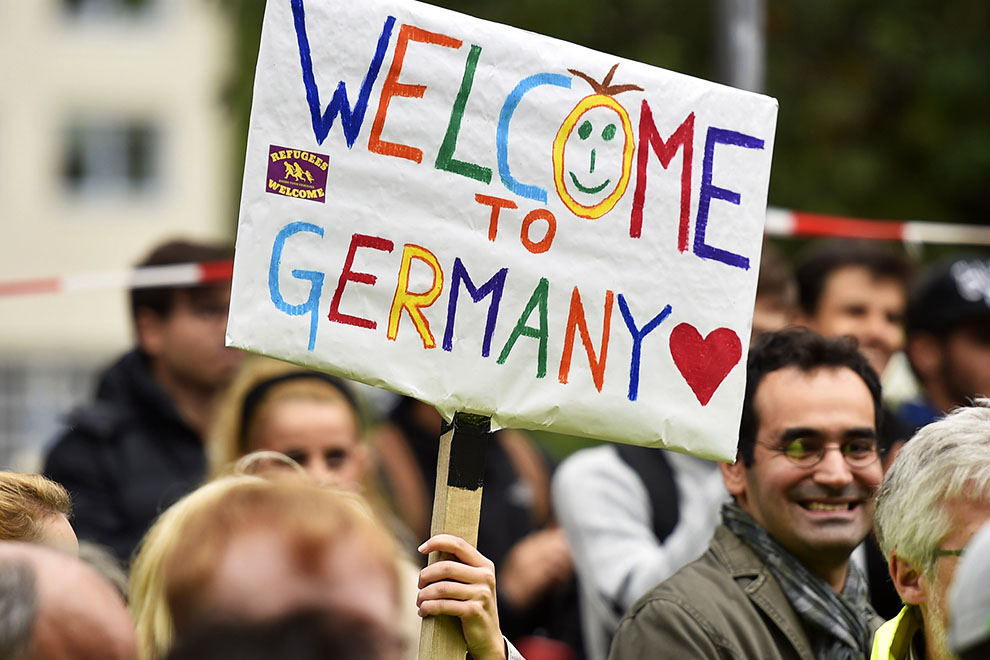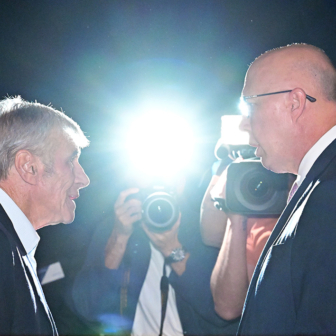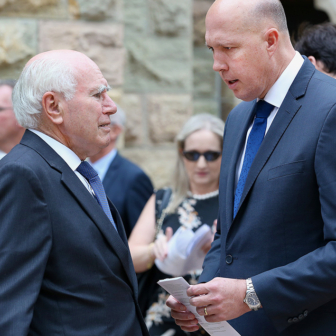Prime minister Tony Abbott is in favour of increasing the number of Syrian and Iraqi refugees allowed to resettle permanently in Australia. But when he announced on Sunday that Australia would “step up to the plate,” he didn’t have in mind an increase of the overall number of visas for refugees, who currently make up just 3 per cent of migrants accepted into Australia each year. More Syrian refugees would simply mean fewer refugees from other countries, including those in our region. (Under pressure from NSW premier Mike Baird and other influential members of his own party, he is now likely to increase the overall intake.)
Contrast this with Germany. Last weekend alone, around 15,500 displaced people crossed the border from Hungary. The German immigration service expects a total of 800,000 new asylum applications this year, and many of the new arrivals will be allowed to stay.
Those figures don’t put Germany in the same league as Turkey, Lebanon or Jordan, which are accommodating close to four million displaced Syrians between them. But 800,000 is a frighteningly large number, and taking in that many people will stretch the capacity of Germany’s local governments and welfare organisations. In comparison to other affluent countries, Germany can claim with some justice to be doing more than its fair share.
What explains the willingness of the German government, and also of the majority of Germans, to welcome such a large number of displaced people? The reception is all the more remarkable because it’s not too long since the arrival of a smaller number of asylum seekers triggered a public outpouring of hatred and eventually prompted the German parliament to water down the right to asylum enshrined in the national constitution, the so-called Basic Law.
This was during the Balkan wars of the early 1990s, when hundreds of thousands of people fled to Germany from the former Yugoslavia. Refugees were frequently referred to as Scheinasylanten – “pseudo asylum seekers” – and told to go back where they came from. On at least two occasions, angry mobs tried to burn down hostels in which asylum seekers had been housed.
We shouldn’t idealise Germany’s reaction to the latest surge in numbers. Arson attacks and xenophobic demonstrations have occurred this time, too, particularly in the southeastern state of Saxony, and there has been much racist chatter online. But these responses have been dwarfed by an overwhelmingly welcoming attitude.
Germany has good reason to welcome refugees – particularly those who are young and have transferrable skills. It has an ageing population, and there are real concerns that the age pension system will become unsustainable. It also has a perennial image problem. Most recently, it has made itself unpopular among some of its European neighbours by vetoing Greek requests for debt relief. Opening its doors to refugees highlights Germany’s credentials as a good global citizen.
But pragmatic reasons alone can’t explain why most Germans seem relatively relaxed about the large number of non-German-speaking foreigners being allowed across the border. Nor do they explain why Germany’s response contrasts so sharply with Australia’s: after all, Australia, too, has the opportunity to make its neighbours forget, once and for all, about the White Australia policy by leading the way in providing security to forcibly displaced people in the Asia-Pacific region.
Anyone looking for the reasons for the differences – between then and now, and between Germany and Australia – could do worse than have a close look at a recent statement by chancellor Angela Merkel.
For months, while a small minority of xenophobes had become increasingly vocal and violent, Merkel did what she does best: she adopted a policy of wait-and-see. Or – to use a term that is likely to be voted the 2015 Jugendwort (youth slang word) – she merkelte, appearing to dither about an appropriate response both to the refugee crisis and to the racist reaction among some Germans.
Last week, she finally spoke up. And when she did, she didn’t mince words: “Es gibt keine Toleranz gegenüber denen, die die Würde anderer Menschen infrage stellen.” (There will be no tolerance towards those who question the dignity of others.)
The key word here is Würde, or dignity. It had also been used by interior minister Thomas de Maizière, who said that three principles ought to guide the approach to refugees: dignity, security for those seeking Germany’s protection, and decency.
Würde resonates powerfully in Germany. Article 1(1) of the Basic Law of 1949 begins with the words, “Die Würde des Menschen ist unantastbar” (“Human dignity shall be inviolable”). This and the next eighteen articles of the Basic Law constitute a German bill of rights; for West Germans, in particular, the rights enshrined in the Basic Law have been an important part of what it means to be German.
Merkel’s and de Maizière’s emphasis on Würde signals that any debate about how to respond to the thousands of migrants arriving every day in Germany will not just be about Germans’ compassion or anger or fear but will also be about the rights of the new arrivals.
This is the vital difference between the current discussions in Germany and Australia, where an outpouring of public support for Syrian refugees didn’t happen until viewers and readers were shown the heart-wrenching image of a drowned boy on a Turkish beach.
The second sentence of the Basic Law’s Article 1(1) is also relevant: “To respect and protect [human dignity] shall be the duty of all state authority.” Merkel – as well as just about every other mainstream political leader in Germany – has been unambiguous: the government will come down hard on anybody who does not respect the human dignity of those seeking Germany’s protection.
German political leaders agree that in dealing with xenophobes there is no alternative to the zero tolerance approach. Not least, this consensus is the lesson drawn from the racist rhetoric and violence of the early 1990s. The genie of a populist xenophobia was briefly let out of the bottle when mainstream politicians empathised with Germans who said they were afraid of being swamped by foreigners. It took many years and the concerted efforts of the political establishment and civil society groups to put it back in.
Merkel is afraid the genie could be unleashed once more. She knows the importance of not kowtowing to the populist far right. She was asked how to respond to xenophobes, racist thugs and people regurgitating the ideologies of right-wing extremists. Did she think it was important to establish a dialogue with people on the far right? She replied:
We need to clearly distance ourselves. There can be no apologies… The key is not to show even the slightest bit of understanding. No biographical experience, nothing that happened in the past, nothing, absolutely nothing justifies [their] stance.
In the second half of the 1990s, Pauline Hanson claimed to speak for millions of disaffected Australians when she railed against asylum seekers and Indigenous people. Australia’s mainstream leaders tried to accommodate some of the views of her followers, and publicly empathised with those who feared that “boat people” would take their jobs or that their front gardens would become subject to native title claims.
Unlike in Germany, racist innuendo and the demonisation of asylum seekers arriving by boat still have a place in mainstream political debate in Australia. Politicians are still suggesting that seeking Australia’s protection is illegal. Shock jocks still have licence to make inflammatory statements directed at people on account of their religion or ethnicity.
As long as the Australian conversation about refugees and asylum seekers is guided by feelings rather than by a human rights framework, and as long as mainstream political leaders try to gain electoral mileage by condoning views and policies that don’t respect the dignity of all human beings, citizens and non-citizens, Australia’s response will differ starkly from that currently on show in Western Europe. •
Updated 8 September 2015




